Welcome......to my
electronic professional portfolio, or "e-folio." Here you can learn something about
my background, my interests, and the kinds of work that I do. You will find links on this site to courses I teach, things I have written, talks I have
given, and software I use. Please note that links will open in new windows.
Please feel welcomed to contact me about anything that
interests you in these pages. I can be reached by e-mail at
rstoecker@wisc.edu, or at the following office:
Department of Community and Environmental Sociology, 350 Agricultural Hall, 1450
Linden Drive, Madison, Wisconsin 53706.
phone: 608-890-0764
fax: 608-262-6022
A Brief Biography:Raised in a small town called
Mukwonago, Wisconsin, after
being born at the end of the post-WWII baby boom in 1959, I was both too young
and too geographically isolated to have much direct experience with social movement and social
change activities. But somehow I still became infected with the culture of
the time. And I set out to find ways of promoting progressive social
change.
As an undergraduate student at the
University of Wisconsin-Whitewater,
I gravitated to an alternative first-year program called Integrated Liberal
Studies, which focused on issue-oriented education rather than
disciplinary-focused education. We didn't learn about physics, and
political science, and chemistry, and history. Instead we took courses
like "Energy" where we learned about the laws of thermodynamics, 1970s
government energy policy, changes in the forms of energy usage over time, and
other things that taught us the lessons of those disciplines in the context of a
real issue. The experience forever ruined my ability to think in terms of
a single discipline, and I consequently ended up designing my own major that
integrated a variety of social sciences.
Partly because I was looking for an excuse to stay in town while my life
partner finished her undergraduate degree, and partly because I was still
looking for the best way to support social change, I then enrolled in a Masters
program in Counseling. I learned half of the communication skills I practice today
from my mentors in that program.
When we graduated and moved to the University of Minnesota where I began work
as a Ph.D. student in Sociology
(changing the world one person at a time using counseling was too slow for me so
I decided it would be more efficient to work on entire societies instead), I
began to receive the other half of my training in communication skills.
The training came outside of the academy, however, as I got caught up with a
most amazing set of neighborhood activists in the Cedar-Riverside neighborhood of Minneapolis who had not only saved their
community from the wrecking ball, but had gone on to rehabilitate their
neighborhood housing that was left to rot by absentee owners. I finally found my
niche for working with social change--the neighborhood community--and received
my Ph.D. in 1988.
I then became an Assistant Professor at the University of Toledo, where I
was involved in
working with neighborhood organizations--helping them do strategic planning,
conduct needs assessments, and evaluate their impact. We now have a model
for this kind of work--where academics partner with community-based social
change efforts--called community-based research or CBR. You can read more
about CBR in the research section of this e-folio. I have also continued to
work with the neighborhood in Minneapolis that started it all, and have even had
a number of opportunities to work with community projects in Melbourne,
Australia.
I am now a Professor in the Department of Community and Environmental Sociology at the
University of Wisconsin, with an associate affiliation at the Center for Community and Economic
Development, beginning July 2005. This position has taken me into expanded work in academy-community partnerships and community leadership development. I have been involved in work trying to amplify the community voice in service learning, and build community power. Most recently, I and my students have worked with The Urban Community Arts Network, Justified Anger, Community Shares of Wisconsin, SouthWest Madison Community Organizers, The Natural Step Monona, and the Madison Area Cooperative Housing Alliance.
Research Interests:It is important to me that you not think of
my "research" work as something that is designed mostly to fit on a shelf.
Nearly all of the research I do these days is part of the work of community
organizations striving for social change. The most recent books
I've worked on are focused on building the capacity of the community sector.
You can click on the book graphics to find out more.
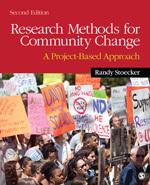
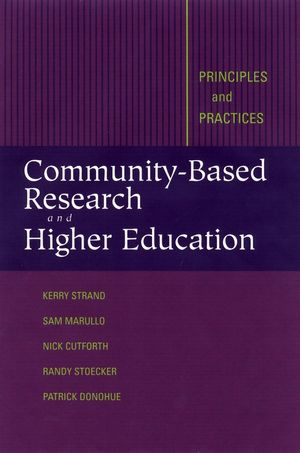
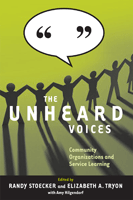
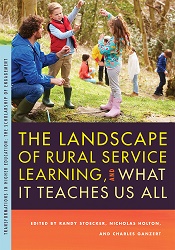
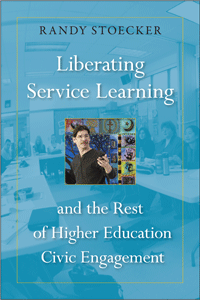
Consequently, all of my research, teaching, and community work these days starts with the word "community."
The two main topics I work on are called community organizing and development, and
community-based research and service learning.
For those of you who want to know more, you can
view my
full curriculum vita (for those not familiar with the term, it is a very long
resume)
Teaching Interests:Similar to my research interests, my
teaching interests also start with the concept of community. I have
recently taught these classroom-based courses:
Community
Response to Pandemics
Community
Organizing
Community Development
Becoming a Community-Engaged Scholar
My other courses involve engagement with community groups. My students have worked with me on intense community engagement projects, including:
Community-Based Research: This course involved a dozen students in conducting interviews with 65 community groups on their perceptions of service-learning. It led to a major community project producing a set of community standards for service-learning and the book The Unheard Voices.
Community-Based Research with The Natural Step Monona
. This course involved a dozen students in working with The Natural Step Monona to distribute 3100 surveys door to door in the Monona community to learn about community sustainability issues. It led to a long-term partnership with TNS Monona involving two more courses, helping shift water conservation policy in the City of Monona, and engaging over a dozen other Monona community groups in water conservation activities.
Community-Based Research with Southwest Madison Community Organizers and the Theresa Terrace Leaders group
. This course is part of another long-term partnership, involving two classes of students, and supporting resident organizing that won a new community center for the residents of the Theresa Terrace area of southwest Madison.
Community-Based Research with Neighborhood House--Madison's oldest community center. This course renewed a relationship I had with Neighborhood House some years earlier, and involved I and the students collecting data from interviews and archives on all 100 years of the organization's history.
Community-Based Research with the Urban Community Arts Network--an organization dedicated to eliminating racialized discrimination against Hip-Hop culture in Madison. I have done four courses with UCAN, all research projects documenting and challenging discrimination in the city.
Community Engagement:
Since moving to Wisconsin, my career has shifted more and more toward higher education community engagement. Now, most of my teaching and research are directly involved with various community organizing and development efforts, and you may have learned from the previous sections. Some of my more recent rewarding involvements include:
Community-based research with the Madison Area Cooperative Housing Alliance.The Urban Community Arts Network, Justified Anger, Community Shares of Wisconsin, The Natural Step Monona, and SouthWest Madison Community Organizers.
Strategic planning facilitation with The Grassroots Leadership College, Community GroundWorks, the Madison Area GROW Coalition, Rural Urban FLOW, and many others.
Facilitation, Training, and Speaking:I do a variety of facilitation, training and speaking activities. Much of that work revolves around
helping to develop higher ed-community partnership programs and to facilitate
community-based research projects. But I also work with community groups to support their capacity development. My expertise includes:
- planning process facilitation
- community-based research design and facilitation
- empowerment evaluation
- service-learning
I have been doing more and more training with community groups and academics around maximizing the community impact of service-learning and community-based research, especially with my University of Wisconsin-Extension work. I have had the pleasure of facilitating workshops with national and international groups, community coalitions, academic-community partnerships, and higher education institutions ranging from community colleges to Research I universities and everything in between. You can learn about some of the groups I have worked with over the past decade in my CV.